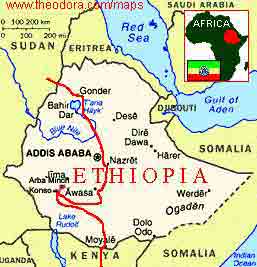

stretchers and Karo body painters, are among
the most fascinating on the African continent.
They also have a different calendar; they are currently in the year 1995,
which means than in Ethiopia I am only 39 years old. The first day of the
year is the 11th of September (sounds familiar?), Christmas is celebrated
on the 7th of January, the time is different as well, when it's 6am for us
it's midnight for them so when they tell you that the bank open at 2am it
means 8am for us, very confusing sometime.
Thursday 26 Dec.
Because of the election in Kenya on the following day, the World Vision people
insisted that I crossed the border in case of trouble.
Crossing the border was a little more complicated than I expected. On the
Ethiopian side they insisted on searching all my luggage, which means that
I had to unpack everything while they went through it. The laptop and the
video camera had to be declared, this is to prevent me selling it in the country.
The whole process took 2 hours but I was not in hurry having planned to stay
for a couple of nights in the town anyway.
Some of you have asked me what I do about money; I carry traveler's checks
in US currency which I usually cash in banks or bureau de change. When I leave
a country I try to have enough cash to get me to the next major town where
I will be able to change more money, the trick is to change just enough for
that particular country.
Saturday 28 Dec.
It was good to be back on a sealed road. I had to concentrate on riding on
the right side of the road though, there was hardly any traffic at all and
I reached Yabello at around midday.
I had planned on leaving the bike there and to visit the towns of Konso and
Arba Minch by local transport. The reason for that was because they had had
plenty of rain and the rivers were fairly high making it very difficult to
cross as there are no bridges.
The idea behind this little detour was to visit some of the very isolated
tribes like the Mursi. I arranged to leave my bike and most of my luggage
at the hotel where I was staying for a small price.
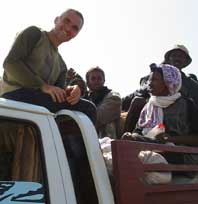
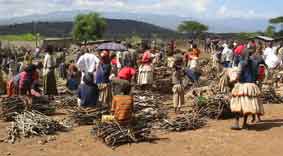
Thursday 2 Jan 2003
Early that morning I caught a truck back to Konso and later on another one
to Yabello and arrived there at 5pm with only a couple of minor incidents
like flat tyres.
I was glad to see my bike and my luggage intact.
There is not much to do in Yabello and walking through the town is far from
pleasurable as you get surrounded by hoards of screaming, giggling or shouting
kids and adolescents screaming at you "You! You! Give me money"
or "You! You! Where are you go…!" The bad news is that it's
not only in Yabello but all over Ethiopia. It's very distressing, exhausting,
infuriating and demoralizing. I don't think I will ever get used to it. Ethiopia
is probably one of the most assisted countries in the world, especially in
the last 20 years with all the aid organizations, now they associate white
people with money. Also, tourism is quite new in Ethiopia; they are not used
to us, so maybe in a few years they will change their behavior or it is just
wishful thinking?
Back in my room I did not have much to do either as the power was not on.
I was so desperate that I started to read again the only book that I have.
Agatha Christie is good but when you read it for a second time, you definitely
know who the murderer is even before Hercule Poirot himself.
So I was glad to leave that place early the next day, at 6.30 actually, I
was heading to Awassa, some 300km further north on a beautiful sealed road.
It was quite cold at first but warmed up very quickly, the countryside was
lovely and people were waving at me as I went past. I could hear the "You!
You..." as I went trough the villages.
I reached Awassa at midday and found the Unique Park Hotel, a bargain at US$3.00
per night; the hotel is set in a beautiful garden right by Lake Awassa.
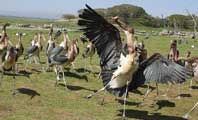
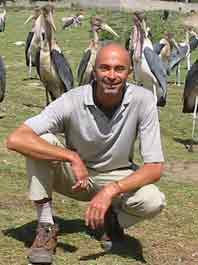
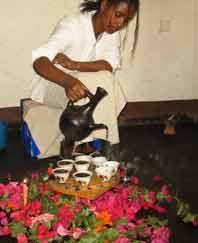
introduction, in broken English, we were sited
and brought a plate of popcorn with bread, also a drink based of sugar canes
was served to us. Having just had breakfast, eating was the last thing I wanted
to do but you have to be polite, so we ate as much as we could and were quite
pleased when they took everything away from us. Our joy was short lived as
they brought us a plate of injera garnished with all kind of meat. Again,
let me tell you about injera. It is the national bread-like staple and is
made with the indigenous Ethiopian cereal tef. It serves as the base of every
meal, spread out like a large, thin pancake. Food is simply heaped on top
of it. You simply tear off a piece of injera (which looks like an old grey
kitchen flannel to me) with your right hand and wrap it around the food served
with it.
I usually can eat it if I am really hungry and if there nothing else to eat,
but today was not the case. We both looked at each other knowing perfectly
that there was no way around it, we had to eat it. I quickly remember some
of the Ethiopian eating etiquettes.
- Always use the right hand; the left is used for personal hygiene only.
- Avoid touching your mouth or licking your fingers.
- Do not put food back on the tray.
- Take from your side of the tray only.
- However hungry you are, try not to guzzle. (No chance of that today).
- Filling your mouth too full is also considered impolite.
- It is considered good manners to leave some leftovers on the tray. (Hurray!)
Grahame really got into it, I could not, and I was pleased when he started
to take on my side of the plate, I was not about to remind him of the eating
etiquettes, thanks buddy, you saved me.
Then it was finally time for the coffee ceremony. Later on they brought us
some family photos as well as school certificates as the father returned from
work.
We had an interesting time that day and I am not going to forget it in a hurry.
Thursday 9 Jan. 2003
Grahame left today and tomorrow the Word vision will be open again, so back
to work for me, end of the easy time.
Then I will head to Addis Ababa and then north toward Sudan.
Do not miss the second part of the Ethiopian story as I enter the cultural
side of this country.
Aurevoir.
Click here to view
more photos.
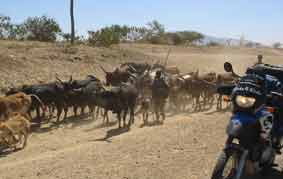
Samedi 28 Déc.
J'ai repris la route vers 9 heures en faisant bien attention de rouler à
droite. Qu'elle plaisir de retrouver une route goudronnée! Le paysage
était ravissant, je m'attendais à voir le desert mais pas du
tout, tout est bien vert avec vaches, chèvres et bien sur des ânes.
Je suis arrivé à Yabello, 300km de route, vers midi et demie
sans aucun problème.
J'avais prévu de visiter quelques villages plus à l'ouest mais
c'est une région très isolée, sans route, juste chemin
en terre. On m'a dit que je ne passerai pas en moto car à cause des
pluies, les rivières sont très hautes et comme il n'y a pas
de pont je ne pourrai pas les traversées. J'ai donc organisé
de laisser ma moto dans l'hotel avec presque tout mes baggages et de continuer
par transport public (camions seulement par içi).
Le lendemain, vers deux heures de l'aprés midi, je partais avec une
cinquantaine de personnes dans un camion pour Konso. Tassé comme des
sardines, sous un soleil de plomb, le voyage ne s'annonçait pas trés
confortable, en plus, les autres passagers n'arrêtaient pas de s'engueuler
pour diverses raisons incompréhensible à mon oreille.
Le voyage devait durer environ 3 heures pour les 90kms, mais déja à
4 heures il s'était arrêté deux fois pour raison mécanique.
Comme je ne voulais pas perdre ma place, je n'étais pas descendu, le
soleil se faisait sentir. A 7 heures du soir il rendait l'âme pour de
bon et nous n'avions mème pas parcouru la moitié du chemin.
Forcèment je n'avais rien pris à manger ou à boire croyant
faire juste une petite promenade un Dimanche aprés-midi, en plus la
nuit était tombée, donc dans le noir je m'apprêtais à
passer la nuit dans mon petit coin car il n'y avait absolument pas d'autres
transports dans la région et personne n'avait l'air de s'inquiéter
du futur.
Vers 10 heures, tout le monde a commencé à s'agiter soudainement,
je me demandais ce qu'il se passait jusqu'à ce qu'à mon tour
j'apercois des lumières de voitures au loin. Effectivement un camion
s'approchait, quand il fut à notre hauteur, tout le monde c'est précipité
dessus et tant bien que mal moi aussi j'ai pu monter dedans. Nous avons continué
notre voyage jusqu'à Konso sans autres problèmes et il était
minuit et demie quand nous sommes arrivés. Bien sur pas d'électricité,
donc je n'avais aucune idée ou j'étais et ou trouvé une
place pour passer la nuit. En demandant à droite et à gauche
quelqu'un m'a finalement compris et m'a conduit dans une maison pour passer
la nuit. Il m'a fait voir brièvement ou était le lit à
la lueur d'une torche et a disparu dans la nuit. Tout ce qu'il me restait
à faire c'était de me coucher car je n'avais rien pour m'éclairer.
A 4.30 heures je me révéillais avec une envie pressante mais
dans le noir ou aller, pas question d'attendre 6.30 heures pour la lever du
jour donc il a fallu improviser, je vous raconterez la suite peut être
une autre fois.
Le lendemain je visitais le marché,
trés rudimentaire mais trés intérréssant car beaucoup
des tribues de la région y viennent. En général ceux
sont les femmes qui portent tout sur leurs dos et marchent pendant des heures
avant d'arriver au marché, c'est pourquoi le marché ne commence
jamais avant 11 heures du matin.
Dans l'aprés midi j'ai rencontré des touristes qui avaient loués
une voiture avec chauffeur à Addis et qui allés à Arba
Minch mon prochain arrêt. Ils n'ont pas hésités à
m'emmener avec eux. Trois heures plutard nous avions parcourus les 90 kms
qui nous séparaient de Arba Minch en traversant plusieurs rivières.
Mardi 31 Déc.
Je ne me voyais guère passer le révéillon à danser,
surtout que pour les Ethiopiens c'est une journée comme les autres,
pas de fête pour eux, jusqu'à ce qu'un groupe de touristes venu
d'Hollande m'invitent à fêter l'événement avec
eux. Ils étaient une vingtaine et avaient tout organisés. Nous
avons mangés dans un restaurant et ensuite nous avons dansés
(surtout eux) jusqu'à 2 ou 3 heures du matin. Bien que j'avais prévu
de continuer ma route le lendemain, mon mal de tête y mis fin et je
passais une journée de plus à Arba Minch.
Thursday 2 janv.-03
A 6.30 du matin un camion me ramenait à Konso et dans l'aprés
midi j'en trouvais un autre pour Yabello. Ce soir là, je retrouvais
ma moto saine et sauve ainsi que mes baggages.
Une chose qui est trés pénible en Ethiopie c'est les enfants
et les adolescants, ils ne parlent pas Anglais mais quand ils voient un étranger
ils crient " toi ! toi ! donnes moi de l'argent " et c'est sans
arrêt. Ou alors " D'ou viens tu ? " ou " Ou vas tu ?
". Je pense que c'est parce que l'Ethiopie est assistée depuis
plus de 20 ans avec des organisations venant du monde entier, donc ils associent
un blanc avec de l'argent. Je pense aussi que le tourist est nouveau en Ethiopie
et ne sont pas habitués à eux, toujours est il que cela nous
rend la vie difficile.
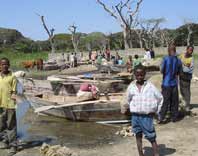
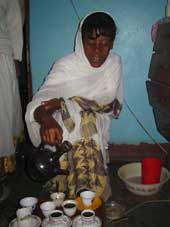
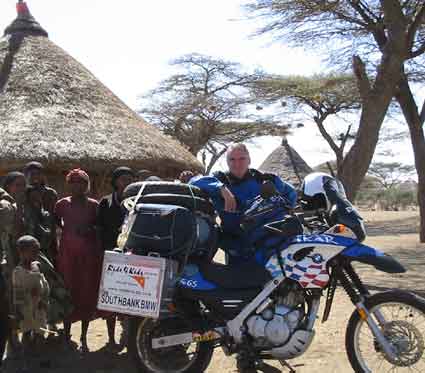



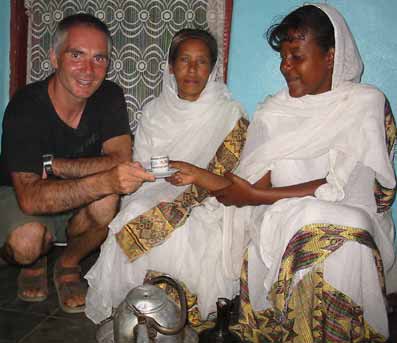
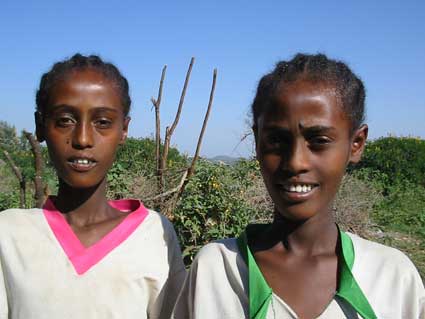

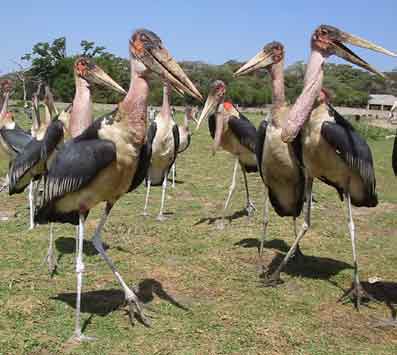
 |
 |
 |
 |
 |
 |
 |
 |
 |
 |
 |
 |
||||||||
|
|||||||||||||||||||